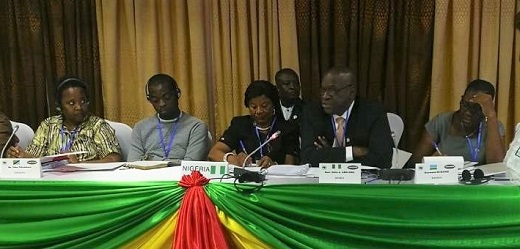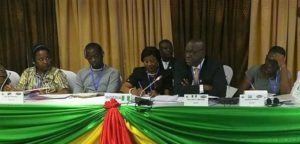Economy
Nigeria Ready to Grow African Trade via Standardisation—SON DG


By Modupe Gbadeyanka
Director General of Standards Organisation of Nigeria (SON), Mr Osita Aboloma, has expressed Nigeria’s willingness to continue to play its required role in ensuring the vibrancy of the African Organisation for Standardisation (ARSO).
ARSO is an organisation set up to promote development within the continent, through improved intra-African trade as well trading with the rest of the world.
Mr Aboloma, while speaking at the ongoing ARSO 56th Council Meeting taking place at Ouagadougou, Burkina Faso, stated that Nigeria was also committed to the economic and social emancipation of Africa using the instrument of standardization as is being done in other continents of the world.
He noted the exemplary contributions of the founding fathers of ARSO of which Nigeria was one, for their vision in sharing and accepting common thoughts on the best ways to stimulate Africa’s development and competitiveness using the strong tool of standardization.
According to him, ARSO is playing a key role in the emancipation of the African Continent through facilitating the harmonization of National and regional standards and conformity assessment processes.
“I wish to add my voice to the need to sustain the existence and effectiveness of ARSO through our collective and selfless contributions” he said.
The SON DG reiterated that Nigeria will continue to support the effectiveness of organisation’s activities in promoting trade, particularly within Africa while also ensuring the competitiveness of its products in the international market place.
Speaking earlier, the President of ARSO who is also the Chief Executive of the Zimbabwe Bureau of Standards, Madame Eve Gadzikwa commended the Government and people of Burkina Faso for hosting the 56th Council meeting and 23rd General Assembly of the Continental standardization body.
The ARSO President stated the theme of the 2017 General Assembly as ‘Celebrating 2017 as the Year of Quality Infrastructure in Africa’ ‘Role of standardization for Better quality and Better life within a continental free trade Area.’
She disclosed that the ARSO five year strategic plan 2017-2022 seeks to build on new strategies to address the challenges of Quality Infrastructure in Africa, under the four goals, namely: to develop high-quality standards and related deliverables through ARSO members; to ensure that African standards are adopted and applied as national and sub-regional standards within the continent; to ensure that ARSO structures and operations are sustainable; and to ensure that Stakeholders are effectively engaged across the entire ARSO standardization community.
Madame Gadzikwa emphasized that the African Union (AU) and United Nations Economic Commission for Africa (UNECA) have variously expressed the need to reduce the Technical Barriers to trade among African Nations.
According to her, the two bodies have undertaken to emphasize on the responsibilities of the African countries, on the impact of standardization, in the expansion of global trade, regional integration as well as multilateral and bilateral free trade agreements.
They then called on the Continental Free Trade Area members to appreciate and recognize the important role of standards, metrology, conformity assessment and accreditation, urging them to harmonize their practices in these area to achieve mutual product recognition.
Also speaking at the occasion, the ARSO Secretary General, Dr. Hermogene Nsegimana enumerated the key programmes and activities of ARSO under the 2017-2022 as including; Technical Harmonisation Committee Meetings; the ARSO Conformity Assessment Programme (ARSO CACO); ARSO Documentation and Information Networks (ARSO DISNET); ARSO Consumer Committee (ARSO COCO); celebration of the African Day of Standardisation and National/continental Essay Competitions and ARSO Capacity Building and Training.
He commended the collaboration and support ARSO has been receiving from its member Nations and development partners towards the achievement of its set targets, promising to continue to promote openness and transparency in the activities of the secretariat.
Economy
Again, OPEC Cuts 2024, 2025 Oil Demand Forecasts

By Adedapo Adesanya
The Organisation of the Petroleum Exporting Countries (OPEC) has once again trimmed its 2024 and 2025 oil demand growth forecasts.
The bloc made this in its latest monthly oil market report for December 2024.
The 2024 world oil demand growth forecast is now put at 1.61 million barrels per day from the previous 1.82 million barrels per day.
For 2025, OPEC says the world oil demand growth forecast is now at 1.45 million barrels per day, which is 900,000 barrels per day lower than the 1.54 million barrels per day earlier quoted.
On the changes, the group said that the downgrade for this year owes to more bearish data received in the third quarter of 2024 while the projections for next year relate to the potential impact that will arise from US tariffs.
The oil cartel had kept the 2024 outlook unchanged until August, a view it had first taken in July 2023.
OPEC and its wider group of allies known as OPEC+ earlier this month delayed its plan to start raising output until April 2025 against a backdrop of falling prices.
Eight OPEC+ member countries – Saudi Arabia, Russia, Iraq, United Arab Emirates, Kuwait, Kazakhstan, Algeria, and Oman – decided to extend additional crude oil production cuts adopted in April 2023 and November 2023, due to weak demand and booming production outside the group.
In April 2023, these OPEC+ countries decided to reduce their oil production by over 1.65 million barrels per day as of May 2023 until the end of 2023. These production cuts were later extended to the end of 2024 and will now be extended until the end of December 2026.
In addition, in November 2023, these producers had agreed to voluntary output cuts totalling about 2.2 million barrels per day for the first quarter of 2024, in order to support prices and stabilise the market.
These additional production cuts were extended to the end of 2024 and will now be extended to the end of March 2025; they will then be gradually phased out on a monthly basis until the end of September 2026.
Members have made a series of deep output cuts since late 2022.
They are currently cutting output by a total of 5.86 million barrels per day, or about 5.7 per cent of global demand. Russia also announced plans to reduce its production by an extra 471,000 barrels per day in June 2024.
Economy
Aradel Holdings Acquires Equity Stake in Chappal Energies

By Aduragbemi Omiyale
A minority equity stake in Chappal Energies Mauritius Limited has been acquired by a Nigerian energy firm, Aradel Holdings Plc.
This deal came a few days after Chappal Energies purchased a 53.85 per cent equity stake in Equinor Nigeria Energy Company Limited (ENEC).
Chappal Energies went into the deal with Equinor to take part in the oil and gas lease OML 128, including the unitised 20.21 per cent stake in the Agbami oil field, operated by Chevron.
Since production started in 2008, the Agbami field has produced more than one billion barrels of oil, creating value for Nigerian society and various stakeholders.
As part of the deal, Chappal will assume the operatorship of OML 129, which includes several significant prospects and undeveloped discoveries (Nnwa, Bilah and Sehki).
The Nnwa discovery is part of the giant Nnwa-Doro field, a major gas resource with significant potential to deliver value for Nigeria.
In a separate transaction, on July 17, 2024, Chappal and Total Energies sealed an SPA for the acquisition by Chappal of 10 per cent of the SPDC JV.
The relevant parties to this transaction are working towards closing out this transaction and Ministerial Approval and NNPC consent to accede to the Joint Operating Agreement have been obtained.
“This acquisition is in line with diversifying our asset base, deepening our gas competencies and gaining access to offshore basins using low-risk approaches.
“We recognise the strategic role of gas in Nigeria’s energy future and are happy to expand our equity holding in this critical resource.
“We are committed to the cause of developing the significant value inherent in the assets, which will be extremely beneficial to the country.
“Aradel hopes to bring its proven execution competencies to bear in supporting Chappal’s development of these opportunities,” the chief executive of Aradel Holdings, Mr Adegbite Falade, stated.
Economy
Afriland Properties Lifts NASD OTC Securities Exchange by 0.04%

By Adedapo Adesanya
Afriland Properties Plc helped the NASD Over-the-Counter (OTC) Securities Exchange record a 0.04 per cent gain on Tuesday, December 10 as the share price of the property investment rose by 34 Kobo to N16.94 per unit from the preceding day’s N16.60 per unit.
As a result of this, the market capitalisation of the bourse went up by N380 million to remain relatively unchanged at N1.056 trillion like the previous trading day.
But the NASD Unlisted Security Index (NSI) closed higher at 3,014.36 points after it recorded an addition of 1.09 points to Monday’s closing value of 3,013.27 points.
The NASD OTC securities exchange recorded a price loser and it was Geo-Fluids Plc, which went down by 2 Kobo to close at N3.93 per share, in contrast to the preceding day’s N3.95 per share.
During the trading session, the volume of securities bought and sold by investors increased by 95.8 per cent to 2.4 million units from the 1.2 million securities traded in the preceding session.
However, the value of shares traded yesterday slumped by 3.7 per cent to N4.9 million from the N5.07 million recorded a day earlier, as the number of deals surged by 27.3 per cent to 14 deals from 11 deals.
Geo-Fluids Plc remained the most active stock by volume (year-to-date) with 1.7 billion units sold for N3.9 billion, trailed by Okitipupa Plc with 752.2 million units valued at N7.8 billion, and Afriland Properties Plc with 297.5 million units worth N5.3 million.
Also, Aradel Holdings Plc remained the most active stock by value (year-to-date) with 108.7 million units worth N89.2 billion, followed by Okitipupa Plc with 752.2 million units valued at N7.8 billion, and Afriland Properties Plc with 297.5 million units sold for N5.3 billion.
-

 Feature/OPED5 years ago
Feature/OPED5 years agoDavos was Different this year
-
Travel/Tourism8 years ago
Lagos Seals Western Lodge Hotel In Ikorodu
-

 Showbiz2 years ago
Showbiz2 years agoEstranged Lover Releases Videos of Empress Njamah Bathing
-

 Banking6 years ago
Banking6 years agoSort Codes of GTBank Branches in Nigeria
-

 Economy2 years ago
Economy2 years agoSubsidy Removal: CNG at N130 Per Litre Cheaper Than Petrol—IPMAN
-

 Banking2 years ago
Banking2 years agoFirst Bank Announces Planned Downtime
-

 Sports2 years ago
Sports2 years agoHighest Paid Nigerian Footballer – How Much Do Nigerian Footballers Earn
-

 Technology4 years ago
Technology4 years agoHow To Link Your MTN, Airtel, Glo, 9mobile Lines to NIN




















